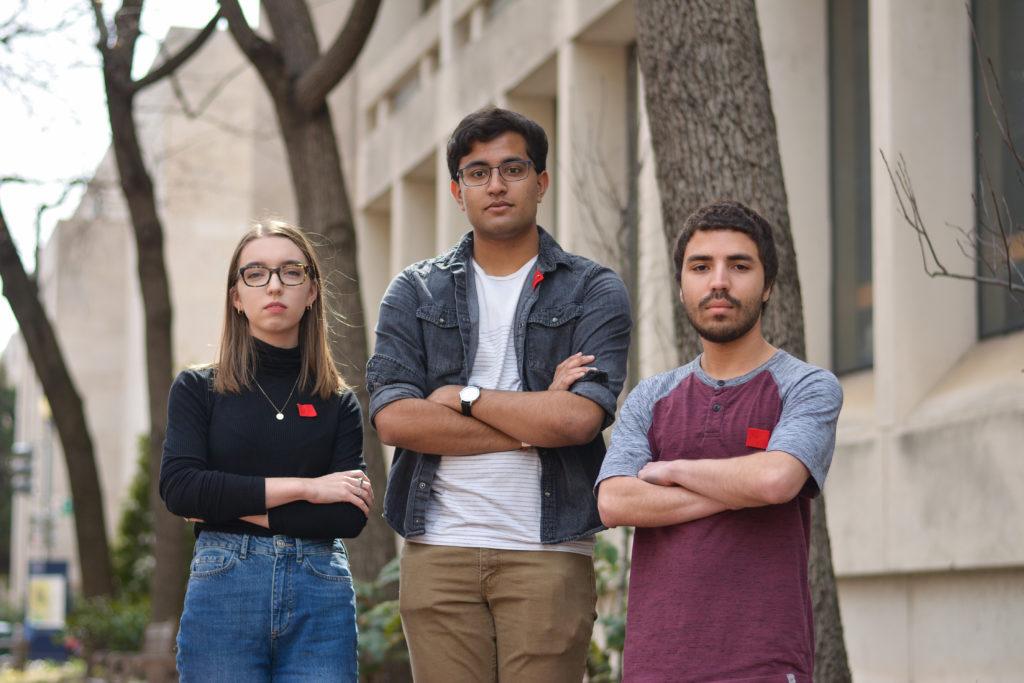Six months after the Progressive Student Union delivered a letter to administrators listing 10 demands they said would improve the lives of University employees, members say their concerns have gone unheard.
Members of PSU wrote a letter to University President Thomas LeBlanc last semester urging him to overhaul GW’s system of hiring and maintaining employees. But students said that while they have attended meetings with top officials, administrators have not taken steps to improve worker conditions – so the group has instead employed new strategies, like knocking on residence hall doors, to recruit more students to their campaign and further pressure officials.
“Band-Aid solutions like establishing task forces and committees aren’t going to cut it because it’s just a way for the University to drag its feet and continue to stall on issues that there’s no reason to be stalling on,” freshman Pranay Somayajula, a member of PSU, said.
In their initial letter to LeBlanc, members of PSU asked officials to stop using third-party contractors to oversee employees, clarify overtime policies and offer free transportation to workers who live off campus.
Sophomore Emily Harding, a member of PSU, said two members of PSU attended LeBlanc’s office hours for about 15 minutes last November, where they ran down their list of requests. Harding said LeBlanc declined to arrange an additional meeting and deferred their concerns to Dean of the Student Experience Cissy Petty.
Since their first meeting with LeBlanc, Harding said members of the group have met with Petty twice – once last semester and once at the beginning of this semester – and members also met with Interim Vice President for Human Resource Management Dale McLeod and members of the Board of Trustees, all of whom listened to their demands but did not enact change.
Petty could not be reached for comment through a University spokeswoman.
Harding said the organization wants officials to meet their demands by the end of the semester, but she declined to say what members will do if their demands are not met by that time.
“At this time, we are focused on winning our demands by the end of this academic year because these injustices are urgent and need to be fixed now,” she said. “However, as long as GW continues to mistreat workers, we will do what is necessary to make their voices heard.”
Harding said that because officials have not met their demands, students involved with PSU have gone door to door across residence halls to speak to students about the demands over the past semester.
“When we go door to door and we talk with students and explain the issues that are going on on an everyday basis that affect workers, most people are really sympathetic and also shocked that these issues exist on the campus where they live,” Harding said.
By talking with students, she said members of PSU also learned issues that affect federal work-study employees, like an expectation that those students prioritize work over academics.
In the original letter, PSU demanded that officials simplify the scheduling process for student employees, but members now want departments to survey federal work-study recipients to decide whether they should use the same scheduling system. Harding said the change could ease the process of coordinating students’ schedules.
“As we continue to build relationships and have conversations with workers, we’re making sure that these demands represent the people that we want to help as accurately as possible,” Harding said.
Senior Josh Gross, a member of PSU, said the organization has also received support from other campus organizations, including the Faculty Association, D.C. Fair Food and D.C. Jobs with Justice. He said the organizations have publicly voiced support for PSU’s campaign and urged officials to install methods for “better worker treatment.”
He said the organization has also received more than 1,000 signatures on a petition supporting the campaign that was launched late last month.
“A big part of what our campaign has been doing since we sent that letter is coalition building, basically trying to get as much support for our demands and better treatment of workers on campus as possible,” he said.





